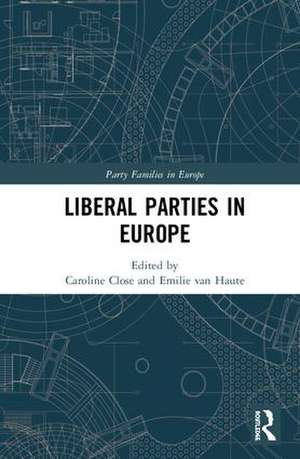Liberal Parties in Europe: Party Families in Europe
Editat de Emilie van Haute, Caroline Closeen Limba Engleză Hardback – 14 feb 2019
The history of liberal parties in Europe is peculiar and the origins of the liberal family are not clearly defined. Liberal parties are still quite heterogeneous given the various meanings embraced in the idea of liberalism, including economic liberalism, cultural liberalism, progressivism, social-liberalism. Bringing together the best specialists engaged in the study of liberal parties, and with a two-levels perspective (comparative and case study), this book renews and expands our knowledge on the liberal party family in Europe. Four major themes are developed, linked to the four approaches of the concept of party family: electoral performances, participation to power, ideology and political program, and party organization. These themes are systematically developed in case studies, and in comparative chapters.
Primarily aimed at scholars and students in comparative politics, this book should especially appeal to scholars in the fields of political parties and party systems, representation and elections, voting behavior, and public opinion.
| Toate formatele și edițiile | Preț | Express |
|---|---|---|
| Paperback (1) | 395.25 lei 43-57 zile | |
| Taylor & Francis – 30 iun 2021 | 395.25 lei 43-57 zile | |
| Hardback (1) | 1009.74 lei 43-57 zile | |
| Taylor & Francis – 14 feb 2019 | 1009.74 lei 43-57 zile |
Preț: 1009.74 lei
Preț vechi: 1231.39 lei
-18% Nou
Puncte Express: 1515
Preț estimativ în valută:
193.23€ • 200.52$ • 161.51£
193.23€ • 200.52$ • 161.51£
Carte tipărită la comandă
Livrare economică 17-31 martie
Preluare comenzi: 021 569.72.76
Specificații
ISBN-13: 9780815372387
ISBN-10: 0815372388
Pagini: 412
Ilustrații: 29 Line drawings, black and white; 37 Tables, black and white; 29 Illustrations, black and white
Dimensiuni: 156 x 234 x 24 mm
Greutate: 0.73 kg
Ediția:1
Editura: Taylor & Francis
Colecția Routledge
Seria Party Families in Europe
Locul publicării:Oxford, United Kingdom
ISBN-10: 0815372388
Pagini: 412
Ilustrații: 29 Line drawings, black and white; 37 Tables, black and white; 29 Illustrations, black and white
Dimensiuni: 156 x 234 x 24 mm
Greutate: 0.73 kg
Ediția:1
Editura: Taylor & Francis
Colecția Routledge
Seria Party Families in Europe
Locul publicării:Oxford, United Kingdom
Public țintă
PostgraduateCuprins
Introduction Part I: Case studies Chapter 1: The Norwegian Left and the Finnish Centre: What, no capital ‘L’ liberal parties? Chapter 2: The Danish Liberal Parties Chapter 3: The Centre Party and the Liberals: The Swedish members of the liberal party family? Chapter 4: Liberalism in the Netherlands: The VVD and D66 Chapter 5: Belgian Liberals: Living apart together... Chapter 6: Diversity, unity, and beyond: The Swiss Liberals Chapter 7: Liberal parties in Austria Chapter 8: It’s (not only) the economy, stupid?: Past and future of the German Liberal Party Chapter 9: The UK Liberal Democrats: Liberalism at a crossroads Chapter 10: Fianna Fáil: In the Liberals but not of the Liberals Chapter 11: Nuanced liberalism: The weakness of liberal parties in Spain Chapter 12: Liberal parties in Central and Eastern Europe: Between success and failure Chapter 13: Latvia, Lithuania, and Estonia Chapter 14: The Liberals in Europe: The alliance of Liberals and Democrats for Europe Part II: Comparative perspective on liberal parties in Europe Chapter 15: Liberal parties and elections: Electoral performances and voters' profiles Chapter 16: Governmental participation and alliances of liberal parties in Europe Chapter 17: The liberal party family ideology: Distinct, but diverse Chapter 18: How liberal parties organise Liberal parties in Europe: Conclusion
Notă biografică
Caroline Close is an Assistant Professor at SciencePo ULB, Centre d’étude de la vie politique (Cevipol), Université libre de Bruxelles (ULB). Her main research interests are party organization, intraparty politics, party ideology, legislative studies, elections, and democratic innovations.
Emilie van Haute is an Associate Professor and Chair of SciencePo ULB and conducts her research at Centre d’étude de la vie politique (Cevipol), Université libre de Bruxelles (ULB). Her main research interests include party membership, intra-party dynamics, participation, elections, and voting behaviour.
Emilie van Haute is an Associate Professor and Chair of SciencePo ULB and conducts her research at Centre d’étude de la vie politique (Cevipol), Université libre de Bruxelles (ULB). Her main research interests include party membership, intra-party dynamics, participation, elections, and voting behaviour.
Recenzii
‘In a period of high party system volatility, this timely book focuses on a group of parties that includes some of Europe’s oldest electoral competitors. Its chapters present useful profiles and comparisons of meaning and endurance of party family labels.’
— Susan E. Scarrow, University of Houston
‘With detailed case studies of the history, ideology, organization, electoral performance, and governmental participation of liberal parties in 20 European countries, plus at the EU level, this volume provides a most useful resource for students of party politics. In addition, the concluding comparative chapters provide the necessary analysis to consider whether there truly is a liberal party ‘family’ and the features that unite and distinguish these parties from their competitors.’
— William Cross, Carleton University
— Susan E. Scarrow, University of Houston
‘With detailed case studies of the history, ideology, organization, electoral performance, and governmental participation of liberal parties in 20 European countries, plus at the EU level, this volume provides a most useful resource for students of party politics. In addition, the concluding comparative chapters provide the necessary analysis to consider whether there truly is a liberal party ‘family’ and the features that unite and distinguish these parties from their competitors.’
— William Cross, Carleton University
Descriere
This book investigates how liberal parties have evolved over time as a party family, in a comparative perspective. Through a discussion of the applicability of the concept of party family to liberal parties, it gives a better picture of the development, challenges and opportunities for liberal parties in Europe.



